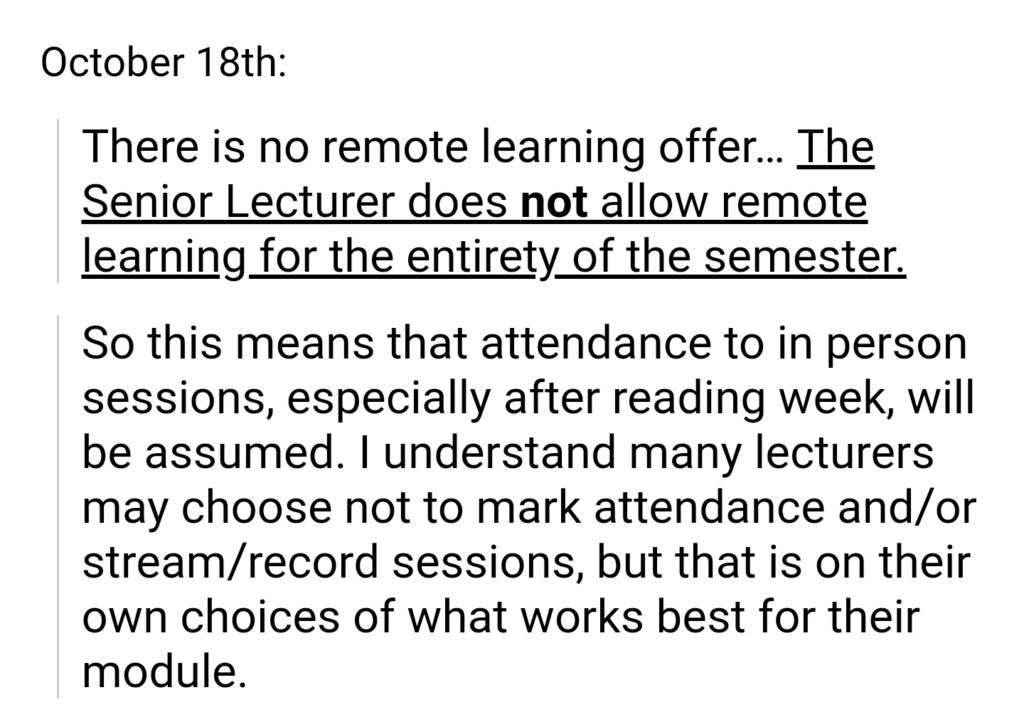Students4Change has undertaken a research on inclusivity at Trinity College Dublin and has found that there is a rigid, inflexible system which is a barrier to accessing education for many, especially disadvantaged groups.
Students4Change has always advocated for choice for students regarding online or recorded lectures. Other universities already have hybrid learning, such as 293 Colleges in the U.S. which employ hybrid learning (Source: C2I).
During the pandemic, students with disabilities faced increased barriers with regards to their education. One of these barriers was not-recorded, online live events which posed challenges for students with, for example, hearing difficulties.
Despite the return to face to face lectures, some students may be hesitant or anxious to come back in a full time capacity, either due to general anxiety around the ongoing pandemic, or due to them having vulnerable family members that means that they cannot take the risk, however small, of catching Covid-19 when in college.
Recently, staff complained of a lack of CO2 monitors, which measure how well rooms are ventilated. College could have worked on ventilation during the summer, but they choose not to, possibly due to the expenses associated.
Students who commute from long distances to come to college often have to get up very early, and have worse sleep schedules than students who live closer to college. The mental toll reduced sleep has on a student’s performance could be minimised if hybrid learning was implemented, giving students the opportunity to commute later and watch the recorded lecture when they have time later on in the day, not to mention financial considerations.
“My first semester of College cost ~150€ in bus fares and my girlfriend has spent about 50€ last week on train fares, ” says a student.
With the unaffordability of accommodation and many students commuting, recorded lectures and hybrid learning opportunities offer a more equal playing field for all students to get a quality education with reduced barriers to entry, not to mention that since not all courses were recorded during the Covid-19 pandemic, some students had less access to education than others, and as such, it was not a level playing field. It needs to be ensured that this does not happen again.
This issue will also manifest itself if in-person exams return, with students having to travel for online and in-person exams, both which might be scheduled for the same day.

The issues surrounding lecture recording have been dealt with in our press release on September 12th, and it is our view that these issues are surmountable.
Student testimonies support a policy for hybrid learning. There is a moment, here and now, to push for this, and to build back better. Despite this, College’s re-opening plan is still chaotic and has barely an inclusivity considerations.
For example, a student shared with us that they were promised the ability to follow College online on September 6th, but College backtracked on this by the 18th of October, despite document proof that they are in HSE’s “high-risk” category. At the moment, their case is being helped by the Disability Service, but the outcome is expected to last weeks, at which point almost the whole term will have gone by.

In a similar vein, there are a variety of exclusivity-related issues in College, namely that the LENS system is not effective enough. In one case, there was a part of a computer science module to which a student had to travel to 2.5 hours every Thursday to present their work, despite “it taking about 5-10 mins per student”.
“I emailed the lecturer explaining that I have severe travel anxiety (supported by my LENS) and wondering if I could just email my code in each week, however he adamantly refused to offer this. I even met with the head of my school and the Disability Services and nothing could be done about this and I was forced to take that travel time each week,” they say.
LENS reports are very limited in scope of what they can mandate from lecturers, and that does not guarantee that a lecturer will immediately grant what entitled to when a student has a LENS. The LENS primarily revolves around smaller things like alternate exam venues (instead of the RDS), a small amount of extra time in exams and access to the respite spaces on campus (which are themselves incredibly limited in scope, allowing only short amounts of time in them and requiring booking in advance). Any form of accommodations beyond what is in a student’s LENS are entirely up to the lecturer, and it is on the student to request them, which can be a demeaning experience.

In some cases, the widthrawal of remote access seems absurd. For example, in the Computer Science department, remote lab access was withdrawn. They could reserve a few for remote access, but either there are a lack of computers or this consideration was not taken into account.
As such, a pattern was found to emerge. Casework by the Unions help, but the system by large remains insufficient because of bureucracy. As one student put it, “support services [during Covid-19] did not apply to people who are genuinely seeking help. They are a bandaid to a larger problem, that you have to beg for the process knowing it won’t ease the pain”. “Case-by-case” basis can produce results for some, and is better than nothing, but it also means that there is no effective long-term policy for dealing with an issue.
Specific issues that have been raised with us in our research:
- The changeover of TCD-supported disability aid software from Grammarly to Microsoft Editor was done without consideration or consultation to users.
- LENS report applied marking scheme not being used for grading assignments. E.g. no penalties for spelling and grammar would fall under this citerion.
- Lecturers need to be aware that for some students, there is a marked difference in how they absorb information, which is different for online and in-person education, e.g. for discussion-based learning.
- Emails go ignored, which is an issue for cases which have deadlines. For example, for one module’s assesment, voice narration was required, “I was struggling with a lot of anxiety when talking to other people, [so] I reached out to my lecturers for the module asking if I could write my part for the update, and my emails were completely ignored”, they say.
- For assesments, more leeway should be given. Considerations that should be given include for those with slower reading and writing times for essays (e.g. dyslexia), those with chronic migraines, etc. During Covid-19 in the University of Manchester (which has a radical student movement), mitigation measures included automatic assignment extensions up to 7 days for two pieces of coursework, and the removal of the need to provide medical evidence for mitigating circumstances applications. “I have a good friend who is gonna be given a zero on an assignment despite having an IV in her arm right now because she “doesn’t have a doctor’s note, ” says a student.
- The perception on-the-ground is that there is little to none continued support for hybrid learning. The technology is already partly there in College, so this seems like an absurd decision.
We would like to note that the workload of academic staff, which with ever-increasing administrative and bureaucratic aspects, is also a barrier to access to education for students. It results in academic staff not having as much time as they should to consider individual students on a case-by-case basis.

Similarly, but on another matter, LLM Law students had their graduation on Diwali this year (2020-2021), and despite complaints by Indian students, it was not changed. This means that Indian parents, for example, could not always come and see the graduation of their sons and daughters. Another student missed the graduation sign-up deadline, and despite pleading with the College, was not allowed to attend the ceremony, despite his girlfriend having travelled 4,500 kms to Ireland. These are all signs of a creeping takeover of College by bureaucracy which appears rational, but in reality, is the not conducive to human existence.
Graduation, in any case, should be based on alphabetical order (for being called up on stage), and should have a more inclusive dress code. Dress codes are generally ableist as they do not allow for flexibility in the event of discomfort formal clothes bring to disabled people, such as those with sensory processing issues related to autism where an autistic individual may be averse to the feeling of certain materials. We should also acknowledge non-binary people. Here is a list of policy suggestions that S4C made with the TCDSU’s Welfare Officer.
Schools need more funding, and College needs more democratic and inclusive decision-making structures, and long-term sustainable planning needs to replace chaotic short-termism. The bureaucracy needs to be done away with, and replaced with human-centric structures.
Thank you to everyone who contributed.

Leave a Reply